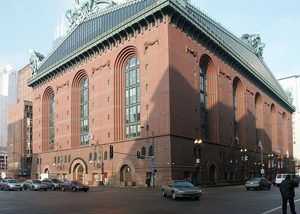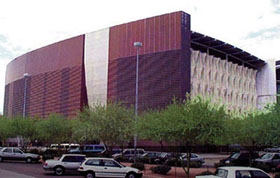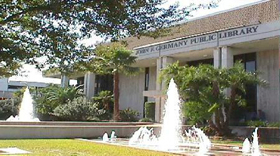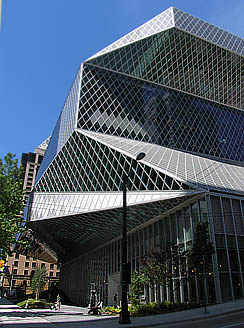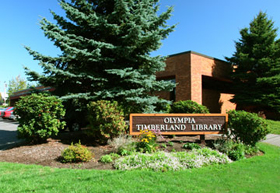Meat
From digitalhumanities
Contents |
[edit] Public Libraries and Librarians in a Changing World
Beginning as early as the mid 1960s, and then rapidly accelerating in the 1990s digital technologies began to change the ways in which libraries had traditionally operated in the United States. Librarians, in fact were among the first non-military individuals to find a practical use for the Defense Advanced Research Projects Agency's (DARPA) new information sharing service which eventually would come to be known as the Internet.
Today collections increasingly consist of online data bases and office tools, in addition to printed materials, music, film, maps, microfiche, and other media. The roles of librarians are changing as well from that of educator to that of tech supporter. Instead of guiding expeditions into the worlds held within pages, they take patrons into the places behind and beyond the screen.
In order to better understand what these changes mean for library users and workers on the ground I interviewed five librarians in five different cities around the country. Curiously the one thing that all five had in common was the desire to remain anonymous. The conversations were often tense, even though my questions were relatively innocuous and innocent. These tensions reflect a debate which is raging (yes, raging) within the field: self proclaimed traditionalists versus self proclaimed forward lookers. Curious - that sounds familiar...
[edit] The Libraries
Harold Washington Public Library Chicago Illinois
Each and every library I call on this little adventure answers with a computer's voice. Always the voice is that of a woman. She speaks to me in English and then in Spanish. Usually this would bother me, but I like the evidence of outreach to non-English speaking patrons. I think of the Portland system and how their computer's voice speaks Vietnamese as well. After a brief interlude with her (wherein my entire vocabulary is restricted to ten numbered keys) an elderly man's voice comes on the line. He doesn't want to talk to me and repeatedly tells me that any questions about anything need to be emailed to the administration for comment. "I could get into serious trouble for talking to you at all" he says a couple of times. He characterizes the "librarian versus a large, very bureaucratic agency" as one in which the librarian must be very careful or risk repercussions. This sounds to me an awful lot like state sanctioned self censorship, but I don't say that. The Chicago library system has upwards of 80 branches, and any flier that's to be hung at any of them has to be submitted to and rubber stamped by central admin. He has worked there since 1991, at the "Central Information Center". Mostly his job consists of answering questions over the telephone and computer. He doesn't do so much general readers' advisory. In fact, the most common questions he gets are regarding genealogy! I find this shocking. Turns out it's always been pretty common but over the last six or seven years it's really gone through the roof.
So now we get down to business and I ask him how the internet has affected his job, his library and his patrons' experience. He grows animated. I'm really enjoying this conversation, and after checking with his desk mate (that's the other thing - everyone I talk too doesn't have time to be sitting around and shooting the breeze. They're at reference desks goddammit!) he seems to cotton to me too. "Two things" he says. "Business dropped off dramatically three years ago or so, and the good news is that it's coming back. Now that's the good news. People are beginning to realize that it (the internet) doesn't have any, or everything and that it's not accurate. Second thing is that it's frustrating because the quality of public life has been going downhill for a while now." He sites post offices as a good example of this phenomenon. "We've become the Phone Company!" And when I don't understand this remark he explains: "Nowadays we're directory assistance. People will call wanting contact information for businesses and a lot of these places hide their phone numbers so you can't get in touch we them. Companies don't want to be bothered, but we can find out how to get in touch with them." This is alright as far as he's concerned, but far from ideal. His job as a librarian is to PROVIDE INFORMATION. He says this in capitol letters. I agree enthusiastically. "I don't see us educating people anymore, I do see us making them technologically competent. I went into this field, and I think a lot of us did, to educate people. More and more that's not the case though. Are we technocrats or are we educators?" We go on in this vein for some time. He brings up another important trend: "Subject specialists" he says, "are being eliminated by attrition. Nowadays you don't have someone who knows the art department inside and out, or history, or business." I say "it's the deskilling of the trade". He agrees.
Burton Barr Central Library Phoenix Arizona
John F Germany Public Library Tampa Florida
I should have known better than to call Tampa. I lived in Tampa for three months and they were three of the strangest and most tragicomic of my life. I hate Tampa. I hate the climate, the racism, the layout. And now I hate the department supervisor for electronic reference and information JFG Public.
I knew from that this was going to be a difficult interview. Upon arriving telephonically in Tampa I was shuffled from underling to underling until I ended up at the desk of Madame Bureaucrat. Madame, as she shall hereafter be known is the principal librarian of the Tampa Public chain and has been involved there in some capacity since the mid 1980s. She spoke in sound bites. She seemed highly competent. Someday she will be my boss and I will resent her.
JFG primarily focuses on children's' programs
Seattle Public Library Seattle Washington
I am transferred by the very sweet "quick answers" boy to the reference desk at the beautiful new glass library in downtown Seattle. A woman answers the phone. She is all business. I am excited to begin and give her my spiel in my nicest, humblest, least threatening voice and she shuts me down. I am irritated. I come at her again and again she will have none of it. Several times she directs me to write an email to the administration and they will answer my questions - she will not and will not even tell me why. I get forceful, she gets downright bitchy. I thank her for her time and bid her farewell. This is my first, but not my last, encounter with people who will not talk to me.
As I mentioned above there is a curious tension that arises when one asks a librarian in a large public systems questions about his or her job, branch, or field. It is, in fact not unlike that which arises when one quizzes a military man about issues of national security. What, I wonder, are they hiding? What could they possibly be worried about? I am referred to "the administration" for all issues of "PR". This stymie is frustrating, but also enervating. It's a mystery! I love mysteries. I call the Capitol Hill Branch, betting that they'll be looser lipped (liberals always are!). It turns out that Seattle librarians are rarely tied to one location, and float from place to place - so it's not the location, in this case that counts. I get lucky regardless.
The woman I end up talking to is a bit rushed. She gets the bit in her teeth and won't stop talking until my interjections get really loud. She sounds youngish and has been working in the system since 1995. She describes her patrons as younger people: "urban youth" in their twenties and thirties, and the older people who live in apartments nearby. The hill is very urban - densely packed multi family homes and high rises according to her, though that's not how I remember it.
When I ask her what she sees happening in the next ten years she interjects with "I don't think anyone could predict that far into the future. Three years, perhaps, but ten? Unrealistic." She tells me that since the latest Seattle bond passed the SPL has been able to refurbish all of its branches as well as adding two brand new locations. This has increased circulation dramatically. It sounds as though the general mood is positive. A lot more emphasis has been put on providing internet connection to "off the street" patrons, which just means that they walk into the library bodily as opposed to calling or emailing. Also a 24 hour online chat service has been established, though when I asked with what success she did not have an answer for me. Most of all she sees her library bring "everyone up to speed on web 2.0" and (this really got me!) expanding service to refugee and immigrant populations to whom libraries and computers have been unavailable in the past.
At this point she's starting to want to get off the phone; she's said her piece and is not responding well to my attempts to further draw her out. When I ask what she would have if she could have everything she says "more of everything" without missing a beat and quickly excuses herself. My feelings are a little hurt, but I do my best to let it go.
Olympia Timberland Library Olympia Washington
See "Burton Barr", above.
[edit] The Conclusions, or Lack Thereof
As the title of this section suggests, I have yet to come to any firm conclusions. Really, who needs conclusions, anyway? There is clearly a transition occurring - one of culture as well as of methodology within the field. As a young person aspiring to librarianship it is a transition, and a discussion which it behooves me to understand and to take part in. I plan to continue interviewing librarians around the country - perhaps moving outside of the field of public the public library and into others. For a (potentially) complete directory of libraries in the United States please see the following web page: http://dir.yahoo.com/Reference/libraries/. It gives an idea of how vast the field is and how varied.
[edit] The Questions
- How long have you been with your library?
- Who are your patrons? What do they use your library for?
- How have you seen your library change?
- How has the advent of the Internet affected your services?
- How has it affected the patrons?
- Where do you see these changes leading you in the coming years?
- If you could wave a magic wand and change anything about your library, or about libraries in general, what would you change?
